Tony-winning playwright Itamar Moses considers the unyielding investment in personal agendas that drive the socio-political divide in our country, around the world, and throughout history in his new drama The Ally, now playing a limited world-premiere Off-Broadway engagement at The Public Theater. Directed by Lila Neugebauer, the narrative takes the form of a long series of conversations, monologues, and diatribes that become increasingly contentious, result in angry confrontations and the estrangement of former “allies,” and offer little hope for a peaceful future. There’s always a “but” or a “what about” but never an “agree to disagree.”
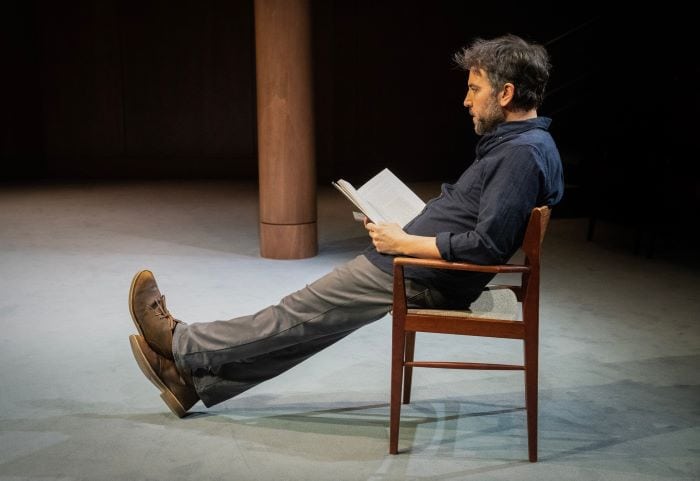
The story centers on Asaf, a dedicated progressive, writer, atheist Jew, and adjunct professor, who moved from NYC to a college town after his Korean-American wife Gwen was hired as the University Administrator for Community Relations and External Affairs, to oversee the school’s expansion into a minority neighborhood. When he is approached by his student Baron to sign a social justice manifesto, written by Nakia (Asaf’s ex-girlfriend and co-activist from their student days, whom he hasn’t seen in twenty years), to protest the police murder, caught on video, of an innocent member of the local Black community (Baron’s cousin) – which also includes pointed references to the ongoing Israeli-Palestinian conflict – it raises important questions about individual perspectives as influenced by race, ethnicity, religion, cultural backgrounds of collective experience, and job security.
Despite his hesitation about the document’s use of the words “apartheid” and “genocide” to describe the actions of Israel (here it should be mentioned that Moses wrote the present drama, set in the fall of 2023, prior to the current war in Gaza), the supportive and diplomatic Asaf signs the document and is subsequently seen as an “ally” by two other student activists – one Jewish (Rachel), one Palestinian-American (Farid) – who ask him to be the faculty sponsor of their campus group, to host a lecture by a controversial Jewish author and vocal critic of Israel on the situation in the Middle East. He agrees, but the provocative speech sets off more tension as expressed by each of the show’s seven diverse characters, broken allegiances and alienation between the others and Asaf, and his self-reflection on what to do, in recognition of the complex relationship between the political and the personal.
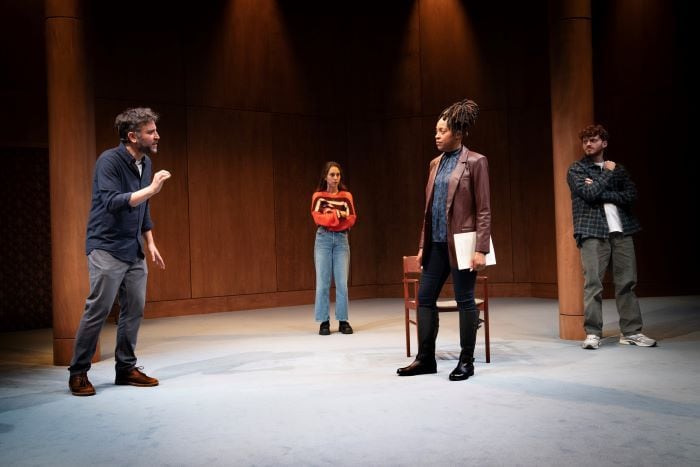
Presented on a mostly bare stage with just two chairs and a lamp (set by Lael Jellinek) and the all-important papers that drive the story (props Claire M. Kavanah), Neugebauer uses the house as the college lecture hall, to immerse us all in the divisive subject and the characters’ reactions to it. She also makes fluid transitions from one scene to the next, as the actors enter and exit without breaks, in conversation with one or more of the characters from the preceding encounter, sitting and standing, moving around the space, speaking, listening, and responding. Moses’ script offers equal representation of all sides, with lengthy and impassioned arguments delivered by his articulate and knowledgeable characters, fully embraced by an intent and persuasive cast.
Josh Radnor stars as the conflicted Asaf, torn between his progressive beliefs, his desire to help his students, his loyalty to his wife, and his fundamental need to do what he thinks is right – not just for himself but for the world. He brings believable emotion and psychology to his character, embodying all the uncertainty, equivocation, and distress, and rendering him fully likeable and sympathetic, with touches of humor interjected (the exchanges between Asaf and Gwen, well-played by Joy Osmanski, are especially funny, while also revealing), to alleviate some of the persistent tension he feels.
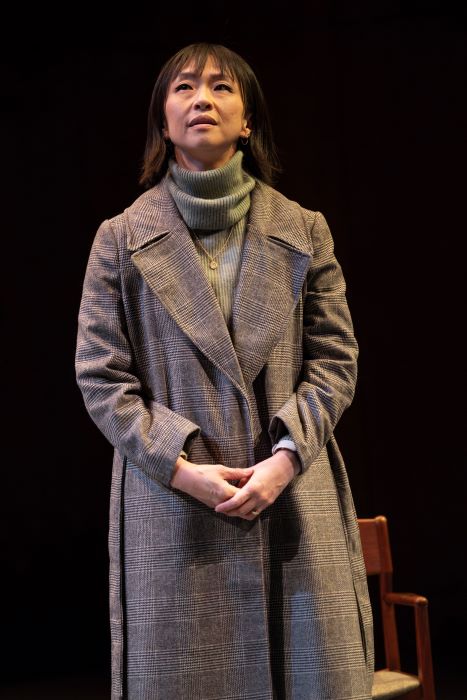
An across-the-board excellent supporting cast provides expressive voices for the committed ideological stances of their characters. Elijah Jones as Baron is somewhat tentative in his initial approach to his professor, then gratified to have him on board, and ultimately disillusioned with him and his doubts about tying in anti-Israeli invectives to the Black Lives Matter manifesto. Madeline Weinstein portrays a youthfully ardent Rachel, who sees the professor as “young, Jewish, progressive, and cool” until she doesn’t, accompanied by Michael Khalid Karadsheh as Farid, who experienced the Palestinian struggles firsthand and grows louder and more vehement with each harangue. Cherise Boothe is a no-nonsense powerhouse as Nakia, as direct and self-assured here as she was in her earlier relationship with Asaf, which caused their split (their unpleasant recollections of a dinner date amusingly indicate the incompatibility of the two). And Ben Rosenfield as Reuven, a PhD student of Jewish History and Judaic Studies, angered by Asaf’s endorsement to allow the tendentious speaker on campus, is unflinching in calling him naïve in his “spirit of openminded- and inclusiveness” that he posits would spread anti-Semitic propaganda and encourage a “normalization of hostility towards Jews.”
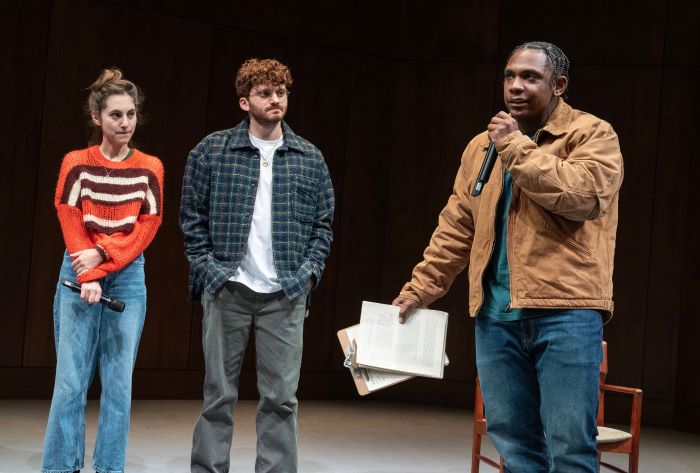
Costumes by Sarita Fellows are simple and indicative of the ages and positions of the characters, with lighting by Reza Behjat and sound by Bray Poor enhancing the drama. In the end, a completely disconcerted Asaf returns to his roots in the Talmud and ponders the words of the ancient Jewish leader, scholar, and sage Hillel the Elder (ca. 30 BCE-10 CE), “If I am only for myself, what am I?” I might add that Hillel is also credited with the Golden Rule, “What is hateful to you, do not do to your fellow” – a principle that was later recorded in the New Testament (Matthew 7:12) as spoken by Jesus, “Do unto others as you would have them do unto you.” It’s a message that transcends cultures and religions. If only people would listen.
Running Time: Approximately two hours and 35 minutes, including an intermission.
The Ally plays through Sunday, March 24, 2024, at The Public Theater, 425 Lafayette Street, NYC. For tickets (priced at $70, including fees), go online.



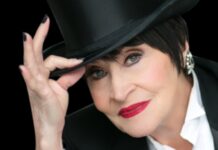


The Ally has been extended for a third time, and is playing now through Sunday, April 7.